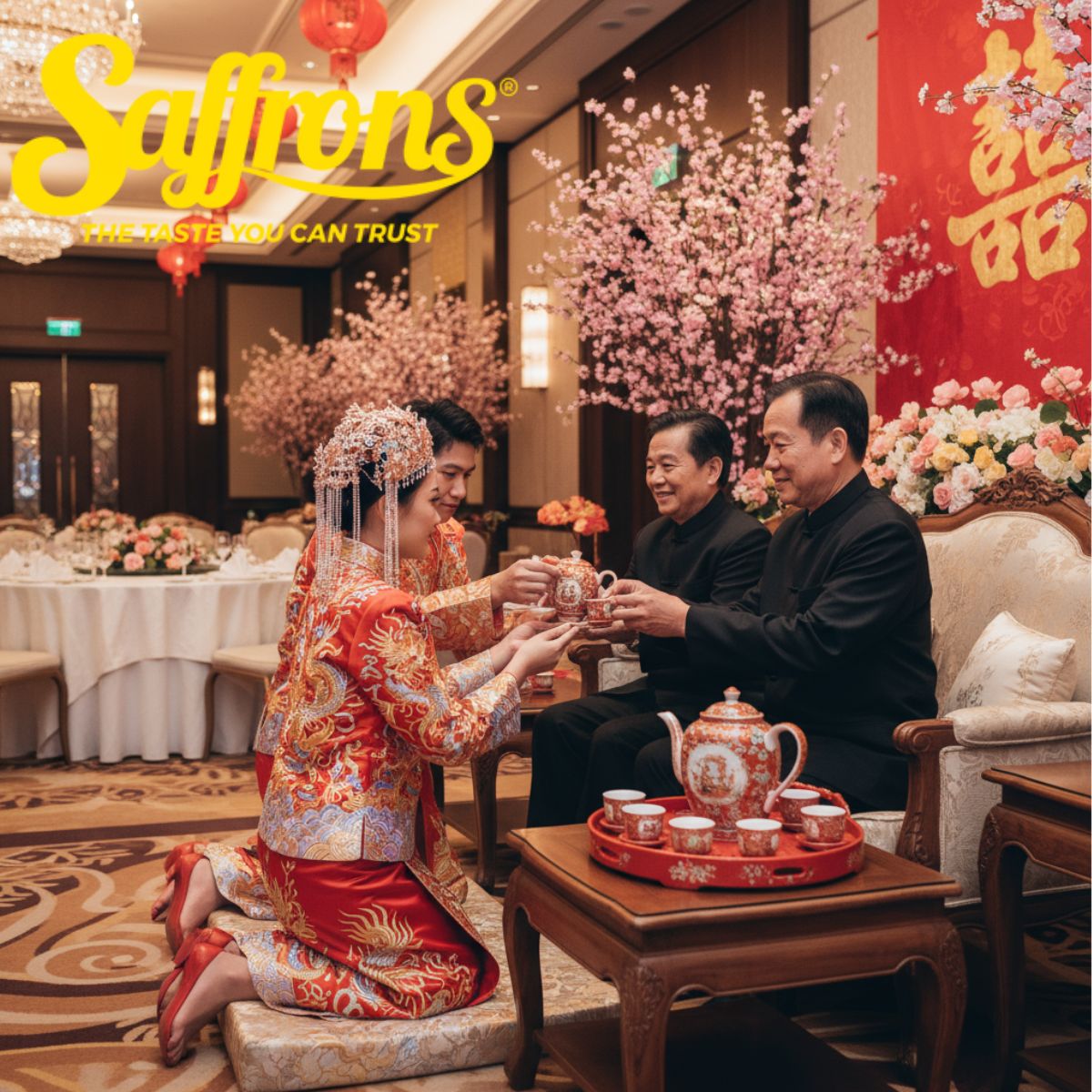
Chinese Wedding Singapore: Complete Guide 2025 | Saffrons

Table of Contents

Saffrons Marketing Team
Food Blogger & Catering Specialist
Delivering the finest culinary insights and special event inspiration. With deep experience in the food industry, we are committed to sharing trusted guides on authentic catering and planning your dream wedding.
Share
Planning a Chinese wedding in Singapore involves coordinating traditional customs, managing family expectations, and selecting venues that honor your heritage while reflecting modern sensibilities. This comprehensive guide covers everything from selecting auspicious dates to executing perfect tea ceremonies and planning memorable banquets.
Essential Chinese Wedding Traditions
Selecting an Auspicious Wedding Date
Chinese couples consult the Chinese almanac (Tong Shu) or engage a Feng Shui master to identify dates that harmonize with both partners' zodiac signs and birth charts. This critical first step influences marital harmony and prosperity according to traditional beliefs.
Dates to avoid in 2025 include Ghost Month (August 23-September 21), Qing Ming festival period, and dates conflicting with either partner's zodiac. Peak wedding months (May, September, November, December) require booking venues 12-18 months ahead.
Guo Da Li: Betrothal Ceremony
Guo Da Li (过大礼) occurs 2-4 weeks before the wedding, where the groom's family presents symbolic gifts to the bride's family signifying respect and family union. Traditional gifts vary by dialect group:
Hokkien traditions include dragon and phoenix candles, wedding pastries (喜饼), wine, rice, sesame seeds, and symbolic fruits. Teochew customs emphasize Si Dian Jin (四点金)—a four-piece gold jewelry set from groom's mother including necklace, earrings, bracelet, and ring. Cantonese ceremonies feature whole roast pork symbolizing purity, comprehensive dried seafood, red dates, and lotus seeds. Hakka traditions uniquely include Suan Pan Zi (abacus seeds) representing wealth, whole roast pork, and extensive dried goods.
Modern couples often purchase pre-arranged Guo Da Li packages from specialized shops that customize according to dialect requirements, simplifying logistics while maintaining symbolic meaning.
An Chuang: Bridal Bed Setting Ceremony
An Chuang (安床) prepares the matrimonial bed 3-5 days before the wedding. A woman of good fortune—married with living husband and children—arranges new bedding in auspicious red colors and places symbolic items on the bed including red packets, oranges for prosperity, dates and peanuts symbolizing children, and lotus seeds for fertility.
Young children jump or roll on the bed to activate fertility blessings. The bed remains untouched until the wedding night, sealing the auspicious preparations.
Hair Combing Ceremony (Shang Tou)
Performed on wedding eve at the bride's and groom's respective homes, Shang Tou (上头) marks the transition from childhood to married adult life. Parents or respected elders comb the individual's hair four times, each stroke accompanied by specific blessings—happiness until old age, harmonious marriage with filial children, abundant descendants, and wealth and longevity together.
After combing, the couple eats tang yuan (glutinous rice balls) in sweet soup symbolizing family togetherness and sweet married life.
Wedding Day Gate Crashing
The groom travels to the bride's home to "fetch" her, navigating gate crashing games created by bridesmaids testing his love and determination. Traditional tasks include answering relationship questions, performing dares, negotiating red packet amounts, and professing love declarations.
Modern gate crashing has evolved into themed games—solving puzzles about significant dates, eating extremely spicy foods symbolizing marriage's sweet and bitter moments, or entertainment performances. Once granted access, the groom presents his bride with her bouquet and helps her put on bridal shoes that bridesmaids hid.
Chinese Wedding Tea Ceremony: Complete Protocol
The tea ceremony represents the heart of filial piety tradition, formally honoring elders and demonstrating the couple's respect.
Tea Ceremony Timing Options
Traditional approach involves multiple sessions—at the bride's home after gate crashing, at the groom's home when the bride enters, and sometimes repeated at the banquet venue. Modern convenience consolidates both families' ceremonies at the banquet venue before the reception, saving travel time.
Proper Serving Order
Tea is served following strict hierarchical order:
-
Grandparents (highest respect if present)
-
Parents (father first, then mother)
-
Uncles and aunts (in age order, not gender)
-
Elder siblings and their spouses
-
Elder married cousins (if applicable)
Younger siblings and relatives serve tea to the newlyweds instead.
Essential Tea Ceremony Elements
Tea set requirements include ornate teapot with auspicious designs, matching teacups (8-12 depending on family size), decorative serving tray in red or gold, and kneeling cushions or chairs.
Tea preparation uses symbolic ingredients creating sweet fortune-blessed brew—red dates for prosperity and children, dried longan for sweetness and harmony, and lotus seeds for fertility and continuous offspring.
The Serving Ritual
A coordinator announces each elder's relationship. The couple kneels or stands together (bride on groom's left), serving tea using both hands with slight bow. The elder accepts tea, drinks while offering blessings like "百年好合" (lifelong harmony) and "早生贵子" (may you have children soon), then returns the cup and presents red packet or jewelry gifts.
The ceremony typically takes 60-90 minutes for both families at a single venue.
Chinese Wedding Venues and Costs in Singapore
Traditional Chinese Restaurant Banquets
Chinese restaurant banquet halls remain most popular for authentic Chinese weddings, offering specialized experience with Chinese customs and in-house authentic cuisine.
2025 Pricing ranges (per table of 10):
-
Peach Garden: $1,038-1,368++ (weekday) to $1,288-1,888++ (weekend)
-
Holiday Inn Singapore Atrium: $1,688-1,738 nett
-
Crowne Plaza Changi Airport: $1,618-1,788++ depending on day
-
Concorde Hotel Singapore: Minimum 15 tables, competitive packages
A typical 30-table weekend dinner costs $45,000-60,000 including 8-course menu, venue, basic décor, and service.
Hotel Ballroom Weddings
Five-star hotels offer luxury ambiance and comprehensive services at premium pricing. Grand Hyatt Singapore accommodates 360 guests with packages from $2,264-$2,983 per table. Goodwood Park Hotel hosts 120-350 guests at $2,024-2,276 per table with prestigious heritage status.
Community Venue Alternatives
Budget-conscious couples choose community clubs with external catering, reducing costs to $15,000-25,000 for similar guest counts through venue rental ($1,000-3,000) plus external catering ($3,000-15,000).
Chinese Wedding Planning Timeline
12-18 Months Before
-
Consult families about dialect traditions to follow
-
Set overall budget with both families' contributions clarified
-
Identify auspicious dates through Feng Shui consultation
-
Book venue (popular venues require 12+ months advance)
-
Engage wedding planner and photographer with Chinese wedding experience
9-12 Months Before
-
Begin Qun Kua (裙褂) shopping—rental $800-5,000 depending on embroidery
-
Plan pre-wedding photoshoot at Singapore locations or overseas
-
Book remaining vendors including florists, entertainment, and transportation
6-9 Months Before
-
Plan Guo Da Li items based on dialect requirements
-
Finalize wedding theme and décor concepts
-
Prepare invitation cards following Chinese etiquette with auspicious wording
3-6 Months Before
-
Conduct food tasting and finalize 8-10 course banquet menu
-
Schedule An Chuang ceremony and identify "good fortune woman"
-
Confirm bridal party for gate crashing and ceremonies
2-3 Months Before
-
Finalize guest RSVP and seating arrangements respecting family hierarchy
-
Order tea ceremony set and symbolic items
-
Prepare red packets for tea ceremony, helpers, and banquet games
1 Month Before
-
Perform Guo Da Li betrothal ceremony
-
Final vendor confirmations and venue walkthrough
-
Last attire fittings and makeup trials
1 Week Before
-
Conduct An Chuang bed setting ceremony
-
Rehearse Hair Combing ceremony with elders
-
Triple-check all vendor timing and logistics
Modern Buffet Alternative: A Growing Trend
While 8-10 course seated Chinese banquets represent tradition, modern Singapore Chinese weddings increasingly embrace buffet catering for guest flexibility with diverse dietary needs, interactive live stations creating entertainment, cost efficiency delivering 20-30% savings, and relaxed atmosphere encouraging celebration.
Why Indian Cuisine Complements Chinese Weddings
Indian buffet catering offers unexpected synergy with Chinese wedding values—both traditions emphasize hospitality through abundant food, feature complex flavorful profiles, celebrate with elaborate multi-dish presentations, and prioritize sharing meals as celebration centerpieces.
Saffrons: Singapore's Premier Halal Wedding Caterer
For Chinese couples requiring halal certification—whether for Muslim partners, interfaith families, or inclusive guest lists—Saffrons provides the solution with 30 years expertise serving multicultural weddings.
Our legendary Gold Class Briyani features premium basmati rice, aromatic spice blends, and tender meats marinated 24+ hours. MUIS halal certification ensures complete Islamic compliance, while our 100% Muslim-owned operations provide authentic religious assurance. Flexible packages suit every Chinese wedding from Essential (community centres) through Premium (ballroom elegance) to Luxury (grand celebrations with live stations).
We've successfully catered Chinese-Malay interfaith weddings, Chinese Muslim convert celebrations, and Chinese families accommodating Muslim guests across ballroom, community centre, void deck, and home venues throughout Singapore.
Contact Saffrons for Chinese wedding buffet consultation — Our multicultural specialists understand Chinese wedding expectations and design customized halal buffet proposals matching your venue, guest count, and family requirements.
Frequently Asked Questions
How much does a Chinese wedding cost in Singapore?
Chinese wedding budgets range $15,000-100,000+ depending on guest count and venue. Average middle-class celebrations with 200-250 guests cost $35,000-50,000 including venue ($45,000-60,000 for 30 tables at $1,500-2,000/table), photography ($3,000-12,000), attire ($3,000-10,000), and pre-wedding ceremonies ($3,000-8,000).
What dialect traditions should we follow if we're from different groups?
Consult both families early to identify essential customs versus flexible elements. Common approaches include following the groom's traditions for Guo Da Li while incorporating the bride's customs for tea ceremony protocols, or creating hybrid ceremonies honoring both backgrounds.
Can we simplify traditions while still honoring culture?
Yes—modern couples routinely streamline customs while maintaining core meaningful elements. Nearly universal traditions include tea ceremony honoring elders, auspicious date selection, and wearing Qun Kua for significant moments. Less essential traditions often simplified include elaborate gate crashing, An Chuang bed setting, and multiple tea ceremony sessions.
What happens during the tea ceremony?
The couple serves sweet tea to family elders following strict hierarchical order—grandparents, parents, uncles/aunts, elder siblings. Each elder drinks, offers blessings, and presents red packets or jewelry gifts. The ceremony takes 60-90 minutes for both families at a single venue.
Do we need halal catering for Chinese weddings?
Halal catering becomes essential when couples include Muslim partners, families, or guests requiring Islamic dietary compliance. Even non-Muslim Chinese couples increasingly choose halal catering for inclusive celebrations where every guest participates fully in the meal—the centerpiece of Chinese wedding hospitality.

Plan Your Dream Wedding
Let us make your special day unforgettable with our premium services
Get Wedding Quote
Ready to Experience Excellence?
Contact us today for premium catering and wedding services
Chat with Us NowMore Articles You Might Like


The Ultimate 2026 Guide to Buying Hari Raya Cookies in Singapore and Johor Bahru: Where to Shop, What to Buy, and Tips for Creating the Perfect Festive Spread
January 29, 2026

Best Halal Catering for Ramadan & Hari Raya 2026 in Singapore: Complete Bento & Buffet Guide
January 27, 2026

Where to Break Fast in Singapore Ramadan 2026 | Saffrons
January 26, 2026

Saffrons Ramadan 2026: Best Iftar & Suhoor in Singapore
January 23, 2026

Johor Bahru Bazaar 2026: Complete Guide for Singaporeans
January 22, 2026
